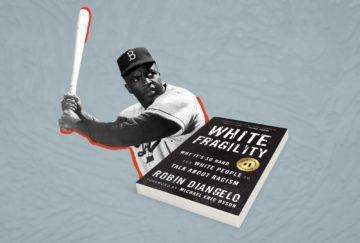Peter Dreier in Boston Review:
 Robin DiAngelo’s book, White Fragility, has been on the New York Times best-seller list for over two years, much of that time ranked number one. The book is assigned frequently in college courses, and DiAngelo is in great demand as a “diversity” consultant to help corporations, universities, government agencies, and other institutions purge themselves of their white privilege. DiAngelo’s core message is that white Americans need to acknowledge their unconscious racial biases which make them, unwittingly in most cases, complicit in what she deems the U.S. racial caste system.
Robin DiAngelo’s book, White Fragility, has been on the New York Times best-seller list for over two years, much of that time ranked number one. The book is assigned frequently in college courses, and DiAngelo is in great demand as a “diversity” consultant to help corporations, universities, government agencies, and other institutions purge themselves of their white privilege. DiAngelo’s core message is that white Americans need to acknowledge their unconscious racial biases which make them, unwittingly in most cases, complicit in what she deems the U.S. racial caste system.
In her book DiAngelo uses Jackie Robinson as an example of her point. Most are familiar with Robinson’s story: in 1947, at the age of twenty-eight, he became the first Black ballplayer to play in the modern major leagues. DiAngelo claims that “the story of Jackie Robinson is a classic example of how whiteness obscures racism by rendering whites, white privilege, and racist institutions invisible.” She continues:
While Robinson was certainly an amazing baseball player, [the] story line depicts him as racially special, a Black man who broke the color line himself. The subtext is that Robinson finally had what it took to play with whites, as if no black athlete before him was strong enough to compete at that level. Imagine if instead, the story went something like this: ‘Jackie Robinson, the first black man whites allowed to play major league baseball.’ This version makes a critical distinction because no matter how fantastic a player Robinson was, he simply could not play in the major leagues if whites—who controlled the institution—did not allow it.
Apparently DiAngelo is not a baseball fan, because, in an error that aligns perfectly with her ideology, she gets this episode of U.S. history all wrong.
More here. (Throughout February, at least one post will be dedicated to honoring Black History Month. The theme this year is: The Family)
